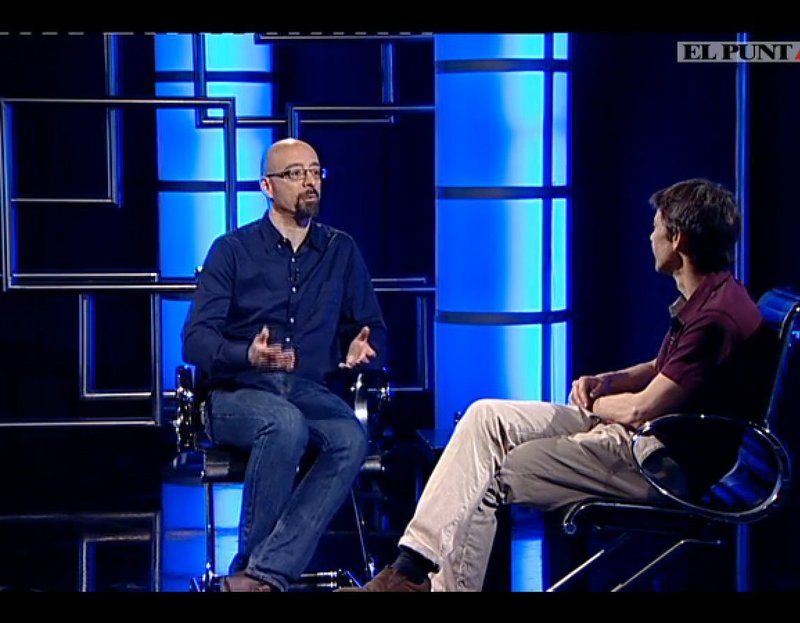Interview
Beat cancer by living longer
Salvador Macip Every Monday at 6.30pm, El Punt Avui TV airs the interview series, Going Native. This week, Neil talks to cancer and ageing researcher at the University of Leicester, Salvador Macip.
Why cancer research?
Cancer was what interested me the most. Cancer is a very important disease that has a lot of impact, and from the biological point of view it is fascinating how a single cell can wreak havoc in the body in the way that cancer does.
What about the mythical 'cure for cancer'?
When we talk about cancer, we are talking about at least 200 different diseases, so finding a single cure for all them is not something anyone thinks about any more. We need many cures for many cancers. And 'cure' is not the right word. Curing cancer means getting rid of cancer, which could happen sometimes, but it really means having the disease under control, just to stop it killing you. So now scientists are thinking about keeping cancer controlled, like diabetes or hypertension, by taking a pill for the rest of your life, maybe.
Isn't cancer just a natural part of living longer?
Yes, but more fascinating is the flip-side: ageing as a consequence of our defences against cancer. It's true that as we age we have more chance of getting cancer and if we lived until 200 we would eventually get cancer. But, also there are a lot of mechanisms inside the cell and the body that prevent cancer. One of the side effects of these defences is that we may be ageing because of it. By the time you turn 50 or 60, you are seeing all the side effects of this degeneration of our bodies as older people. Can we separate them and have protection against cancer without ageing? That is one of the things we are researching and I and other scientists think there is a way to keep them apart, to increase our longevity, or age better or protect yourself against ageing without sacrificing your protection against cancer. In the lab right now, we trying to find something that could somehow stop or delay ageing but not cause you to develop cancer.
People living longer is a serious problem for society.
There's no point expanding lifespan if you end up sitting in a chair for 20 years. So, can we prolong life but keep you active for longer? One experiment we are finishing now is about finding a compound we think could do both things at the same time. That's the goal: you don't want to live to 120 and miss the last 30 years of your life. At the same time, we live on an overcrowded planet, so what's going to happen when we have a pill that can prolong our lifespan? How will we deal with overpopulation? How will young people access the job market? Cracking the ageing problem from a scientific point of view is a great thing but from a social point of view it can complicate things, so you have to think very carefully.
Do you also worry it will only be for the rich?
When the first antibiotics became available there weren't enough for everybody, so only the rich could be saved from pneumonia. Eventually it gets through to everybody, but it's true there is a period of months or years in which only the rich have access to drugs. An example is drugs against AIDS. Now we have all antiretrovirals that were first available in Europe, while in Africa, where the problem is very big, did not have access to the drugs. Now, after a few years, those drugs are getting to them too. This has to be thought through carefully. In my lab and other labs we are close to finding a drug that will slow down ageing. If it's not me, then my neighbour will find it and if not this year, in 10 years. What's going to happen? The social problems will be enormous.
So, it's no longer just science fiction?
I also write science fiction books and things you think are never going to happen, we are now getting ready to do them. It may not be possible today, but it will be in 10 years. So, some of the futures we see in movies and books will be on us sooner than we think, which is something we need to consider very seriously.
And the scientific progress seems exponential.
Science is advancing faster than society, which cannot cope with the things we are presenting. We are talking about things like cloning, which was impossible 10 years ago. We started cloning sheep, but only two years ago there were the first steps into cloning human cells. It it is something that will happen in the coming years. We need to discuss if we want these things to happen. Science and society work together. Scientists don't work in isolation; we work for society, we get money from society for our research, so society needs to tell us where to go. It's important that everyone knows, to talk about it on TV, to write books and give lectures on it so we all understand where science is right now. If I have a pill ready that will let you live 20 years more, we need to see that this is happening soon and that it's not science fiction any more.
Leave a comment
Sign in.
Sign in if you are already a verified reader.
I want to become verified reader.
To leave comments on the website you must be a verified reader.
Note: To leave comments on the website you must be a verified reader and accept the conditions of use.

